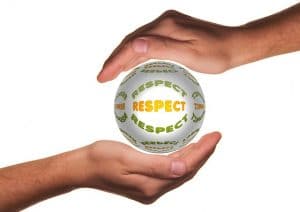Independence: 3 Steps to Get Respect

The feeling of alienation is a very painful one. People in pain want to relieve their discomfort.
The trouble is that they are not qualified to diagnose the origins of their pain nor to prescribe an appropriate course of treatment. This is not a DIY situation. They will misdiagnose the cause of their pain, prescribe the wrong treatment and wind-up exacerbating the original wound.
Many people think that once they know what their problem is, they can handle it by themselves. They would not dare to pull their own teeth, but they imagine they can resolve these issues their own way, in their own good time, without a clue in the world as to how to really solve the problem.
We cannot be objective about ourself because we cannot see ourself the way others do. We think that problem solving is common sense when in reality it requires very uncommon sense. Even doctors cannot treat themselves when they have a problem. Just like a dentist, no matter how good they are, they need to seek out another dentist. They don’t pull their own teeth. This is how uninformed people manage to perpetuate their misery until they die. Life is too short for that.
Many people cannot ask others for the help they need and deserve, just like anyone else. They feel compelled to get things on their own. They have no trust or belief in cooperation, but expect betrayal and abandonment. This theme of self reliance causes hardship in relationships and career because when we cannot trust people to help us, we miss opportunities. Many imagined they are capable of solving problems all by themselves.
Throughout our lives, we improve our skills by taking “courses” and practicing what we learn. If we play sports, we are coached in the basics and practice them until we succeed. At work, we are shown how to perform tasks, then get better and better as we repeat the process. We learn cooking or outdoor grilling, we follow recipes or observe someone with known abilities. Asking for help is how we learn.
But asking for help can be seen as a risk because someone can say no. Taking a risk is scary. It takes courage, and some of us are unwilling to take the risk of facing the unknown for how someone will respond.
If the answer to our request for help is no, we have to avoid taking the “rejection” personally. The antidote is the understanding that self-respect is not conditional upon getting what we want. This is not a reflection on our worth as a person
Many people can trust their judgment to tell them which daily decisions must be resolved immediately, which can wait, and which do not need to be resolved at all. They trust their judgment to tell them how much responsibility is too much and how much is enough. Their judgment is not perfect; perfection is not a human trait. Their judgment is good enough to get the job done. This good enough judgment is not sabotaged by immature beliefs. It is based on unconditional self respect, which is to say that regardless of our good or bad choices, we are equally worthwhile and lovable. This doesn’t go up or down depending on our decisions.
People who have self respect are not trying to get approval like children. They have mature independent identities of their own. They assume appropriate responsibility and exercise good judgment based on the belief that no matter what happens, they will deal with it. No matter what it may be, these people know that they possess the ability to endure and succeed, despite setbacks they may face. This is respect.
Respect is accepting one as a worthwhile human being in spite of one’s faults and imperfections. We generate respect by:
* Accepting ourselves as worthwhile independent of external consideration
* Using our adult judgment to make decisions based on life today (reality).
* Assuming responsibility for our own well-being by knowing when to seek help to over come setbacks.
Tags: Anger Management, Archive
